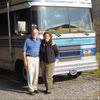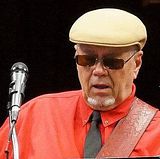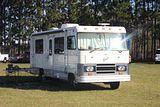Go to...  | Start A New Topic  | Search  | Notify  | Tools  | Reply To This Topic  |  |
 6/12 6/12Formally known as "Humbojb"  |
Can someone tell me the difference between a P30 and a P32 chassis? The 28' Regal I'm to pick up later this month, is said to have a P32 chasis, but independent front suspension. The Gear Vendors guy told me that the P30 had independent suspension, while the P32 had a solid front axle. Both have coil springs supposedly. I would prefer the independent front suspension. Is it possible that this coach has a P32 with independent front suspension? My Trek, the one that wanted to go everywhere except straight down the road, had a P32 with a solid axle. It had such a short wheelbase that no amount of upgrades would make it handle decently. Well, it's somebodyelse's problem now. Would appreciate any knowledge on this subject | ||
|
"First Year of Inception" Membership Club |
All P chassis are independent front suspension. The P-32 has a wheel base of 208 inches. I am pretty positive if you have a coach from the 1980's it is a P-30 and not a P-32. http://www.workhorse.com/rvs/brochure/ps_specifications.asp | |||
|
| First Month Member |
Some P30s have beam axles. My 84 manual mentions P30 and P32 chassis. Dave, I will find it and send a copy. I have sought to no avail to find a definitive answer. Some will say that the late wide-track P is a P32, but the term existed at least a decade before the wide track. | |||
|
 6/12 6/12Formally known as "Humbojb"  |
I talked to a guy at Camping World in Mesa, Arizona today and he said that Chevy did a great job in confusing the world on the P chasis and once they did that, Work Horse make it even worse. Generally, the P32 was on heavier units with a GVWR of over 14000#, and both chasis could have had either a solid axle or IFS. My friend, Jon Bourke, still the owner of the Regal I'm going to Arizona for, said that the chasis number indicated it's a P32 and it has IFS. and I can tell you for certain that it's not a wide body. Now, my P32 1999 Safari Trek, was a wide body, with solid axle and the worst manners you can possibly imagine. | |||
|
I am retired GM Engineer, and we established the P32 chassis designation, in 1971, to seperate the Motor Home Chassis from the P30 Forward Control Chassis, which was currently in production. These chassis can not be used interchangeably, and we didn't want the Body Builders to try to do this. The MotorHome Chassis has certain equipment that is not available on the FC chassis: such as dash A/C,larger fuel tanks, and a tuned supension with very large stabilizer bars. | ||||
|
 6/12 6/12Formally known as "Humbojb"  |
That's great info. The alignment shops should be one of the groups that should be told this each time we take our coaches in to have the front aligned. I would guess that the alignment specs on the P32 are different than the P30? | |||
|
| First Month Member |
Jake, I wish more folks could read your post. There is a lot of confusion and misinformation out there. | |||
|
| First Month Member |
Any shop doing an alignment needs only to be told that it is a motor home and not a potato chip truck. That means more caster. Search this site for specs. When I get home, I will send a copy of the chart from the orange factory motor home chassis manual to Dave for posting. However, I have been a little happier with Supersteer's or IPD's specs. they are not much different than GM's, but allow for road crown. This means little to freeway flyers, but can be of some help to those who drive on secondary roads. | |||
|
 6/12 6/12Formally known as "Humbojb"  |
Bill Really look forward to seeing the specs. I took my old Trek to four different shops to have it alligned and they all did it differently. Hey, sounds like you're on a neat trip! When are you due back home? Jim | |||
|
| First Month Member |
Jim, I'll be back this weekend, so should send the page from the GM manual to Dave as soon as I can arm-wrestle our scanner into submission. In the meantime, here is an old post that might be interesting: Most P32 chassis have saggy springs. The front can be aired up to compensate somewhat, but new coils are best. Supersteer are good. The rears also sag. Air Lift bags can compensate, but a new or re-arched leaf is better. Air bags are a little bouncy, so good springs are best by far. My preference is to have the rear springs to spec for the coach with empty tanks, and use the air lift bags to bring the height back up when black, gray, fresh, and gas tanks, as well as hitch load and motorcycle racks are adding weight. There is a chart from Chevrolet on front and rear suspension height that I will be sending Dave for the Barthmobile archives. Once the front and rear suspension height is corrected, and only then, it is time to have the front end aligned. It must be done to Motor Home specs, not potato chip truck specs. There are recommendations out there that do not mention how the frame sits. That is, is it level, front end low, or front end high. That must be calculated when the caster is set. If your front end man doesn't know about this, find another one. ............................................Henderson-Super Steer suggests: Left Camber .25 deg. +/- .25 deg. Right camber 0 deg. +/- .25 deg. Cross camber .25 deg.Left caster 5 deg. +/- 1 deg. Right caster 6 deg. +/- 1 deg.Cross caster 1 deg. Toe in .25" +/- .06" --------------------------------------------- IPD suggests: Camber: 0 deg. +/- 1/4 deg. Caster: 6 deg. +/- 1/2 deg. Not the same side to side to allow for road crown. Toe in: 5/16" ............................................. Chevrolet Motor Home Chassis Service Guide says: Caster: depends on ride height dimension A and frame angle. Camber: .2 deg. Toe in: 5/16 ............................................. The correct suspension heights and alignment (particularly caster) will really make the coach more stable in winds and truck bow waves. Bilstein shocks and steering snubber, IPD or Hellwig anti sway bar, and Steer Safe or Safe T Steer also help. IPD sells harder vinyl rear anti sway bar bushings. They could cause a bit of oversteer in a non-tag coach, so if you try them, do them gradually, not all at once. Super Steer sells a Panhard bar for the rear. George Henderson has told me that the P32s with the 10 leaf springs might not need them, but I will be building my own soon, anyway. This is even more of an issue with a toad, as a toad can induce oversteer, particularly on downhill curves. Super Steer idler arms are also GREAT at stabilizing and eliminating wander. And have a GOOD front end mechanic adjust your steering box. Lower ball joints wear out first. Be sure you have the correct tire pressures. Have each wheel weighed. Front wheel bearings should be adjusted to 12 ft lbs, backed off to "just loose", tightened by hand grip alone, then backed off to align the cotter pin. Bridgestones are thought by some to ride harder, but they tighten up the steering and stability, and don't have the sidewall failures of the "M" brand. But tires are personal, so my opinion is only an opinion. All of this sounds picky or expensive, but a well set up P30 is safer and MUCH less fatiguing to drive. I no longer need a drink or three to relax after a drive. (now I need another excuse) And I can drive longer without stress. I might suggest here that anyone considering a gas Barth purchase consider a tag axle chassis. They are so much more stable than the single rear axle P32s. I have had both, and the difference is ASTOUNDING. | |||
|
Somewhere along the line, I thought I was told that the "P30" designation was generic (better said as "P3x"). The P32 was the typical forward control version as in the 'potato chip truck' previously mentioned, and the motorhome chassis was designated as a "P37". Of course, this is before Workhorse got into business. In any case, I was also told that the 5th, 6th and 7th digits of the VIN number indicated what chassis you actually had. Take a minute and see if you can find the 'Pxx' designation on your chassis VIN. I'm looking at one on a 1991 Winnebago Warrior that says "1GBJP37NO......." and seems to verify the existence of the P37 version. Broken down further: digit #5 - Line and chassis: P = Forward Control 4x2, G = Van 4x2 (there are more) digit #6 - Weight code: 1=1/2 ton, 2=3/4 ton, 3=1 ton. digit #7 - Body type: 2 = forward control, 7 = motor home, 9 = extended cab/van (there are more, but no "0") What's even worse is the guy that owns this coach cannot find any two alignment shops that agree on how to proceed with an alignment to finish taking care of the violent steering problems he has - even after replacing just about everything in the front end, rear springs, Bilsteins, etc. Mike [This message has been edited by Relative (edited June 09, 2005).] [This message has been edited by Relative (edited June 09, 2005).] | ||||
|
Glassnose Aficionado |
I had to bring this thread up one more time, because it never explained itself to my satisfaction. I assumed my 81 Euro was built on a P30, and have always bought parts as such, but now it seems all these coaches are really P32s. A lot of people threw a lot of info out on this thread but I don't know what to believe. If you want any more specific info on my coach I'd be glad to forward it and we can go from there, but I really am at a crossroads as to what I own. ------------------ Dan & Suzy Z '81 Euro 28 | |||
|
| First Month Member |
I am going to call mine a Pee Thirty-Something Motor Home Chassis. That way, every parts clerk who thinks he knows will be happy. | |||
|
To "Relative". Please do not confuse the VIN definitions with the vehicle model numbers. The VIN definitions are required by the Feds, and are not related to the model designation of the chassis. For instance, Chevrolet had 4 model numbers for the Motor Home Chassis: the P30832, 125" wheelbase chassis; the P31132, the 137" wheelbase chassis; the P31432, the 159" wheelbase chassis; and the P31832, the 178" wheelbase chassis. We had 3 model numbers for the Forward Control Chassis: the P30842, the 125" wheelbase chassis; the P31042, the 133" wheelbase chassis,and the P31442, the 157" wheelbase chassis. As you can see, except for 125" wheelbase, there were different wheelbase lengths, also different frame rails. As far as the saggy torsion bars, I remember making lane changes using a 25' or 28' Sportscoach at the GM Proving Grounds at 60 mph without any problems, other than putting the Sportscoach up on two wheels. One thing that I would do is to change all of the torsion bar rubber bushings, both of the Front bar and the Rear bar, and make sure that the replacement bushings have the same durometer as the originals. | ||||
|
GREAT info! Looks like all the motorhome versions end with '32' and the potatato chip versions end with '42'. Is that where the "P32" comes from for motorhomes? Then the second question is whether or not it makes a difference amongst these models for parts ordering purposes and even more importantly, for alignment purposes? Mike | ||||
|
| Powered by Social Strata | Page 1 2 3 |
| Please Wait. Your request is being processed... |
|
This website is dedicated to the Barth Custom Coach, their owners and those who admire this American made, quality crafted, motor coach.
We are committed to the history, preservation and restoration of the Barth Custom Coach.
We are committed to the history, preservation and restoration of the Barth Custom Coach.

